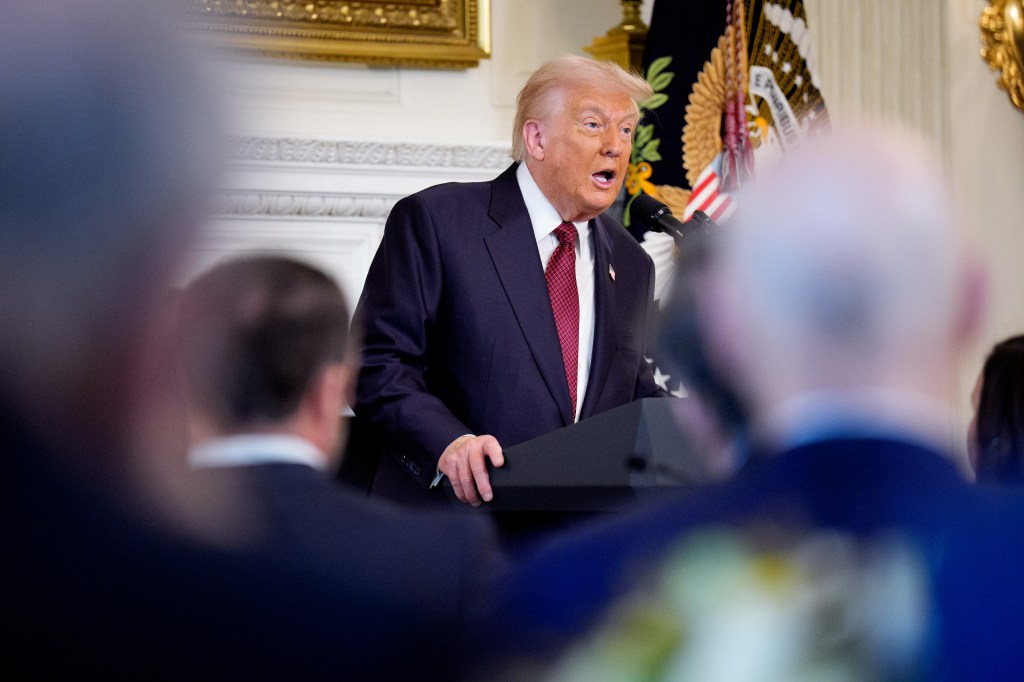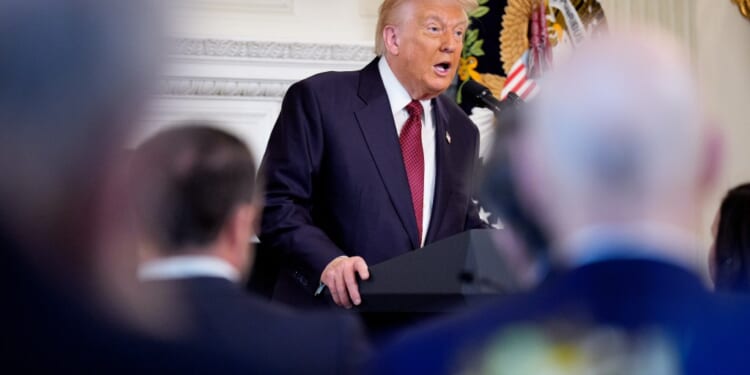
Despite calls from President Donald Trump, Senate Republicans are holding steady on their refusal to eliminate the filibuster—for now, at least.
Fed up with Democrats using the storied Senate rule to block a bill that would end what has become the longest government shutdown in history, Trump told the Republican Senate conference at a breakfast last week to kill the requirement that a bill gets 60 votes to end debate and move to final passage. “It’s time for Republicans to do what they have to do, and that’s terminate the filibuster,” he told the GOP senators. “It’s the only way you can do it. And if you don’t terminate the filibuster, you’ll be in bad shape. We won’t pass any legislation.”
For a Senate caucus that has shown little inclination to act against the president’s wishes, this is one instance in which Trump is unlikely to get his way. A key reason why is that after days of intense negotiations the Senate on Sunday night passed a bipartisan deal with a supermajority, charting a course out of the shutdown that does not include abolishing the filibuster. More importantly, though, as Senate Majority Leader John Thune told reporters last week, “There aren’t the votes” to do it. Close to half of Republican senators have said they want to keep the filibuster in place in the wake of Trump’s comments. What’s more, this is not even the first time Trump has called for the filibuster’s elimination. He did so back in 2018, but Senate Republicans, led by then-Majority Leader Mitch McConnell, refused.
But while the filibuster is safe for the time being, the debate has exposed a divide in the Senate GOP. And recent developments in both parties indicate that the Senate’s longtime practice of unlimited debate—which the current filibuster rules enforce today, serving as a bulwark against rapid changes of policy based on who holds a governing trifecta—is living on borrowed time.
Many Republican senators are more devoted to the procedure than they are enticed by the prospect of getting temporary policy wins from abolishing it. These institutionalists tend to be older and more seasoned members of the Senate.
“We’re not going to get rid of the filibuster,” Sen. John Kennedy of Louisiana told reporters. “I’ve talked to [Trump] about it. We just disagree.”
Others in Kennedy’s camp included Sen. Thom Tillis of North Carolina, who told The Dispatch that saying he is adamantly opposed to abolishing the filibuster is “an understatement.” McConnell also addressed the matter in a rare off-the-cuff comment this week, saying, “We’re not going to do that.”
By contrast, a significant number of younger Republican senators have been warmer to the idea of terminating, or at least altering, the filibuster, especially as the shutdown continued into a second month and social programs such as SNAP ran out of funding.
“This process has radicalized me, this last 36 days,” Sen. Josh Hawley of Missouri told The Dispatch Wednesday after the shutdown broke the record for the longest ever. “And if you’re going to make me choose between helping people eat or defending the filibuster in its current form, then I’m going to choose helping people eat. There’s lots of ways to reform the filibuster. It gets more attractive every day.”
Hawley floated changes such as requiring a lengthy floor speech to stall a bill—a so-called “talking filibuster”—or changing the number of votes necessary to end debate.
Other senators who, like Hawley, occupy a more populist lane in the Senate have embraced Trump’s call to take away the filibuster. That group includes younger senators who are set to continue in the body for longer than many of their institutionalist counterparts. “Let’s get back to work. Let’s do what it takes, whether that’s changing the filibuster rules in the Senate—whatever it takes,” Sen. Jim Banks of Indiana, who was elected to the upper chamber last November, said in a video posted to X. First-term Sen. Bernie Moreno of Ohio has previously floated changing the filibuster to end the shutdown. Asked about Trump’s suggestion of abolition by The Dispatch, Moreno did not state his position, insisting that “the conversation’s moot” because the votes are not there.
One aspiring member of the Senate has also embraced a rules change. “President Trump is absolutely right that it’s time to end the filibuster,” tweeted Texas Attorney General Ken Paxton, who has launched a primary challenge against four-term Sen. John Cornyn. “With control of the White House, Senate, and House, we must seize this moment for America First victories.”
Another primary challenger to Cornyn, Rep. Wesley Hunt, sent out a press release framing Cornyn as facing a choice between sticking with the filibuster or sticking with Trump. It noted Cornyn’s record of defending the filibuster and even included a video he cut in which he criticized Democrats for trying to create a carveout to the filibuster years ago.
For his part, Cornyn at one point defended the filibuster during the shutdown. Asked about Texas Rep. Chip Roy’s suggestion to reconsider the filibuster late last month, Cornyn replied, “Is Chip in the Senate?”
“The House is not the Senate, and the Senate’s not the House,” Cornyn told reporters in October. “There needs to be some place where there’s adequate debate and deliberation, and that would be the United States Senate.” Nixing the filibuster is “bad for the country because we can’t change policies every two years when the new majority wins an election. So it may be expedient, but it’s a bad idea.”
Following Trump’s call for eliminating the filibuster last week, however, Cornyn changed his tune a bit, saying he was open to unspecified changes to the filibuster rules, naming the area of bills that deal with funding the government as a potential “good candidate” for alteration.
One argument that Trump has made to Republicans for abolishing the filibuster is that Democrats are going to do it the next time they control the Senate, so Republicans might as well do it now and gain the ability to more easily advance their own bills. “Knowing that they’re going to pass it as soon as they get any semblance of control—they’ll pass it first thing—then it’s like, we have to do it first,” Trump said at the Wednesday breakfast. Both Banks and Moreno have advanced some version of that argument.
Many Democratic senators have called for eliminating the filibuster wholesale, and the caucus tried to create a carveout for a voting rights bill when they held a governing trifecta during President Joe Biden’s term. They failed, however, because Sens. Kyrsten Sinema of Arizona and Joe Manchin of West Virginia, who later changed their party affiliations from Democrat to independent, objected and refused to provide the requisite votes to do it. Both retired after the 2024 elections, so it is possible a future Democratic-controlled Senate would greenlight such a move.
Sen. Brian Schatz of Hawaii is the likely successor to retiring Sen. Dick Durbin of Illinois as Democratic whip after 2026, and that would make Schatz the favorite to succeed Chuck Schumer as the Democratic leader, especially if Schumer declines to run in 2028. Schatz has also been a proponent of eliminating the filibuster, but he was noncommittal about whether Democrats would do so in the future.
“That’s a caucus conversation, and we don’t even know who would be in the caucus, so I don’t know,” he told The Dispatch last week.
Still, Trump’s argument has failed to convince enough GOP senators. Many Republicans still want to keep the filibuster in place, regardless of what Democrats may do in the future.
Tillis, who is not running for reelection in 2026, acknowledged the possibility that the other party could decide to abolish the filibuster. “And if they want to destroy this country—[it’s] on them. I don’t want to be a party to that,” he said.

















